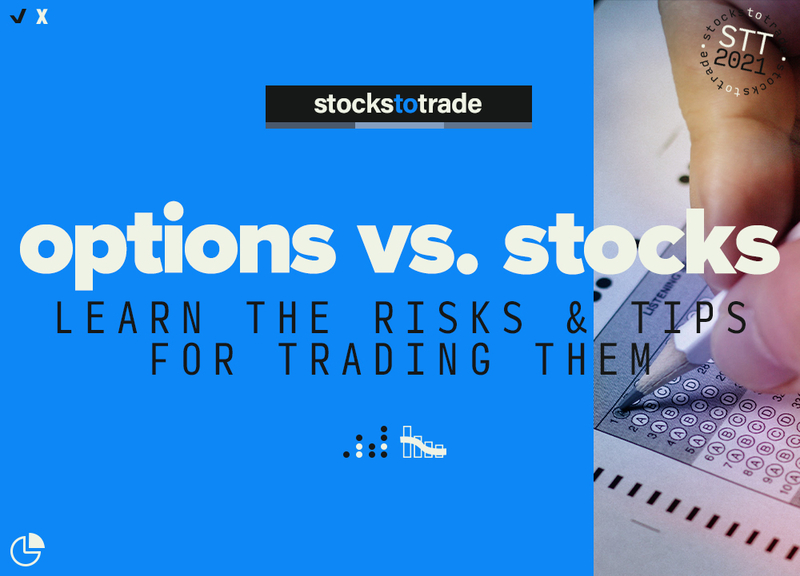Options vs. Stocks: Key Takeaways
- Discover the differences between trading stocks and stock options…
- Learn what an options contract is…
- See how to get started trading options…
Trading options vs. stocks has been a hotly debated topic among traders for decades.
Is one safer or more profitable? There’s no easy answer. But learning about options and how they work is important. So what are stock options and how can you trade them? And what’s the difference between trading options vs. stocks?
Let’s get into it!
Table of Contents
- 1 Options vs. Stocks: What’s the Difference?
- 2 Differences Between Trading Options vs. Stocks
- 3 Option Types: Puts and Calls
- 4 Which Is Safer: Trading Options or Stocks?
- 5 How Much Do I Need to Start Trading Options?
- 6 Options vs. Stocks: Profits
- 7 Are Options Better Than Stocks?
- 8 Is Trading Options a Good Idea?
- 9 Bonus: Options vs. Stocks vs. Futures
- 10 Conclusion
Options vs. Stocks: What’s the Difference?
Unlike stocks, options are represented by options contracts, usually written by institutional investors. One options contract represents 100 shares of stock.
An options contract allows the contract owner to buy or sell stock at a predetermined price (a strike price) before a set expiration date.
The contract owner also has the option to exercise the contract before it expires. When you buy an options contract, you don’t purchase stock — unless you exercise the contract.
Exercising a contract means buying or selling the shares in the contract at the pre-determined strike price before it expires.
If you don’t exercise or trade the contract before the expiration date, it expires worthless.
Trading stocks is more straightforward. With stocks, you buy or sell shares of a publicly traded company on a stock exchange.
The stock will always have some value unless its price drops to $0.
Differences Between Trading Options vs. Stocks
Trading options contracts requires a different approach compared to stocks. That includes your strategy, plan, and execution.
You wouldn’t chug scalding-hot coffee the same as you might with a glass of water, right? Well, think of trading options vs. stocks in the same way. Let’s dig in a little more…
Trading Stocks
When comparing trading options vs. stocks, learning how to trade stocks is generally easier for most … especially for newer traders.
As a stock trader, you pretty much buy or sell.
And stocks have no expiration dates. Shares don’t just become worthless. Usually, a company goes bankrupt, gets delisted, or the stock price drops to $0 per share for that to happen…
There are many different strategies traders use when trading stocks that all follow the same general idea … Unless you’re short selling, but that’s a topic for a different day.
I talk a lot about stock trading strategies in the SteadyTrade Team — swing trading, day trading, and more … If you’re serious about stepping up your game, consider joining the SteadyTrade Team today!
Risks of Trading Options
Trading options can be a lot riskier…
When trading options, you’re trading options contracts. In a nutshell, these contracts allow traders to bet on a stock’s future price action.
There are two different kinds of options contracts: call options and put options.
Call option contracts allow the owner of a contract to buy shares at a set strike price. Put option contracts allow the owner to sell shares at a set strike price — no matter how a stock’s price might fluctuate after the contract purchase.
Options contracts are valued by the price of the underlying company’s stock, the time to expiration, and the price other traders are currently paying for similar contracts.
All options contracts contain three key elements: strike price, expiration date, and a premium.
- The strike price is the price at which a contract could be exercised and shares are bought or sold.
- The expiration date is the date on which the options contract will expire.
- The premium is the fee that a trader must pay to buy the contract. It’s always multiplied by 100. One option contract represents 100 shares of stock.
If a contract isn’t traded or exercised before the expiration date, the options contract expires completely worthless.
Option Types: Puts and Calls
As I mentioned earlier, there are two types of options contracts — call options and put options.
Call options are considered more bullish while put options are considered more bearish…
Options trading activity can sometimes help predict how traders feel about the current market sentiment.
Call Options vs. Put Options

© StocksToTrade
Generally, if an options trader believes a stock’s price will surge higher, they purchase call option contracts.
No matter how high the stock’s price goes, the buyer will always be able to purchase stock at the contract’s strike price before the expiration date.
For example, say you want to purchase a home in a new neighborhood. You believe home prices in this neighborhood will skyrocket in the future. So you want the right or “option” to purchase a house in the future at a predetermined price…
You sign a contract with the developer that allows you to purchase a home within three years at a set strike price. You pay the premium fee for the contract.
Think of the premium as a non-refundable deposit.
The developer keeps the premium fee and you reserve the right to purchase a home for a set price within three years, no matter how high housing prices surge in the future.
If housing prices continue to climb, your contract becomes more and more valuable.
However … if the prices drop below the strike price of your contract, the value of your contract will be close to zero and will expire worthless.
With a put option contract, it’s the same idea … just opposite.
A put option contract gives the owner the option to sell stock at a predetermined price before a set expiration date.
Think of a put option as more of an insurance policy…
Using the same example, a put option contract would allow you to sell a house at a predetermined price before the expiration. No matter what happens to housing prices in the future, the buyer can sell their home for the price determined in the contract.
Which Is Safer: Trading Options or Stocks?

© StocksToTrade
No matter which type of trading you prefer, there’s always risk.
Whether you’re trading options vs. stocks, it’s important to understand the risks and assess your risk management early and often.
Building a thorough trading plan is part of how you work toward becoming a more consistent trader and managing risk.
Still, many consider trading options riskier than trading stocks. This is because an options contract could expire worthless.
A trader could potentially lose all the premium they paid for an options contract if it never reaches the strike price. The value of an options contract could go to $0.
Trading stocks is different. As long as a trader owns stock, they’ll maintain some value as long as the stock price remains above $0.
So the shareholder could sell, whether it’s for profits or to cover a loss. This is one of the key differences between trading options vs. stocks.
That’s why I stay away from options trading. It’s not my thing.
If it appeals to you, great! It all depends on how you approach your trading strategy, and how you manage your risk. Just make sure to try to have a proper trading plan in place.
Focus on your education, first and foremost.
How Much Do I Need to Start Trading Options?
Most brokers don’t require a certain amount of capital to start trading options.
However, some brokers may require a certain level of options trading experience to be eligible to open an options trading account.
Every brokerage is different, so it’s best to find out from your broker directly.
Before you begin trading, assess your account needs and build your trading plan. This will also help you figure out which trading strategies you prefer.
Some brokers allow traders to use leverage for trading options, meaning they let you borrow money to trade. Brokers don’t always do their due diligence and can give too much leverage to inexperienced traders…
A young trader died by suicide in 2020 after realizing he racked up hundreds of thousands of dollars in debt to Robinhood through leverage trading options.
The young trader may have misunderstood his balance. But it’s a cautionary tale to 100% know what you’re doing before getting into options trading.
Options vs. Stocks: Profits

© StocksToTrade
When trading stocks, it’s typically easier to take profits using your preferred sell order once a stock’s price hits your target.
However, when trading options, taking profits can be more complex.
The contract you own must have some value to attract a buyer. There can be less trading volume in options trading than in stocks. So sometimes finding a buyer can be more difficult.
There are also more factors that determine how valuable an options contract is.
The expiration date also plays a big part. The longer a contract has to expire, the more time the underlying stock price has to fluctuate.
This usually isn’t good for the contract’s value, depending on how close the underlying stock’s price is to the contract’s set strike price.
This is what makes trading options vs. stocks so much more volatile. That’s why it’s important to take the time to do extra market research before trading options.
Are Options Better Than Stocks?
Some traders prefer to trade options vs. stocks — and that’s OK.
Whichever type of trading you prefer is totally up to you. It largely depends on your account size, trading knowledge, experience, risk management, trading goals, and trading plan.
No one way of trading is the ‘best.’ Every trader’s unique. It all depends on your preferences and trading goals.
If trading options is more your thing, get crackin’! And if stocks are more your speed, get to work.
Is Trading Options a Good Idea?
Again, trading options vs. stocks is all about preference…
If you understand options trading well enough and feel comfortable trading them, sure.
If you’re new to trading, I recommend starting with paper trading stocks. It’s a great way to develop trading skills — without risking a dime of your capital. And it’s a way to test trading strategies and trading ideas in real time.
You’re not risking money, but you still get a sense of how stocks move, the patterns, and how overall markets sway stocks.
Remember, trading options is NOT the same as trading stocks … Know the difference and do plenty of research.
Bonus: Options vs. Stocks vs. Futures
If you’ve heard of futures trading, you may be wondering what the difference is between options and futures contracts. Aren’t they pretty much the same thing?
Almost. Options contracts and futures contracts are similar … They both have expiration dates, strike prices, and premiums…
But the biggest difference between options contracts and futures contracts is that options contracts don’t require the buyer (or seller) to buy or sell shares before the expiration of the contract.
Futures contracts are an obligation. Shares must be bought or sold.
In futures, there are no options (pun intended).
Conclusion
That’s trading options vs. stocks in a nutshell.
Remember, no matter what kind of trading you prefer, it’s important to fully understand the risks involved before executing that exciting first trade.
Trading stocks vs. options may seem like less of a risk, but that doesn’t mean there’s no risk involved.
If you’re interested in trading stocks OR options, remember to build a plan that fits your goals. Test strategies, learn different techniques, sharpen your skills, and study the markets.
OK … Time to dish on options vs. stocks. What’s your preference? Tell us below!


